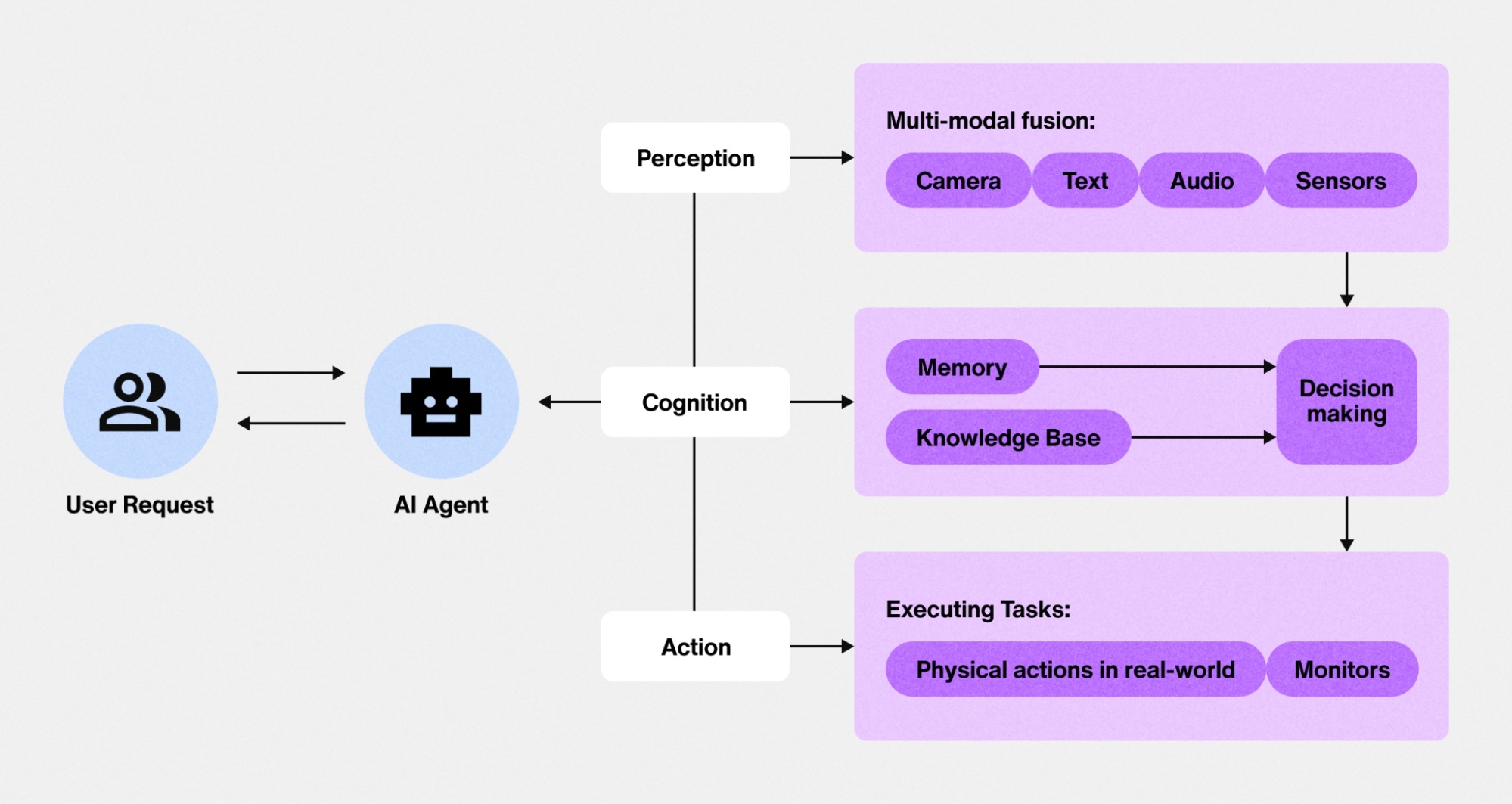AI Agent 🤖
An AI Agent is a computer program that can think and make decisions like a human. It works by observing its surroundings, deciding what to do, and then taking action. These agents are designed to solve problems, complete tasks, and even learn from their mistakes. They don’t need someone to tell them what to do every time they can work on their own. AI Agents use logic, planning, and sometimes learning to get better over time. They can respond to changes, make choices, and keep improving. In simple words, an AI Agent is a smart system that can act on its own using artificial intelligence. It behaves in a way that helps it reach its goals effectively.
1. key Features of an AI Agent:
An AI is an smart software program, that can think, learn and take actions on its own, the key features of an AI Agents includes Reasoning, Acting, Observing, Planning, Collaborating and Self-Refining, which are enlisted below.
- Reasoning means the agent can think logically and make decisions, like choosing the best move in a chess game.
- Acting means it can perform actions in the real or virtual world, such as turning on a smart light.
- Observing means it can watch its surroundings or input, like a self-driving car using sensors to see the road.
- Planning is when the agent makes a step-by-step plan to reach its goal, like planning a delivery route.
- Collaborating means it can work with other agents or humans, like robots assembling a product together.
- Self-Refining is the ability to learn from past mistakes and improve over time, like a spam filter learning which emails to block.
2. Difference Between AI Agents, AI Assistants, and Bots
While these terms sound similar, they are used for slightly different types of programs.
- An AI Agent is a smart system that can sense, think, and act. It’s like a robot brain that can work independently and make decisions.
- An AI Assistant, like Siri or Alexa, is a special type of AI Agent that mainly helps humans by answering questions, setting reminders, or playing music. It’s more focused on helping users directly.
A Bot is usually a simpler program that does one task repeatedly, like a chatbot that answers FAQs or a web bot that collects news articles. It may not be as smart or flexible as an AI Agent.
So, AI Agents are more powerful and decision-making based, AI Assistants are user-friendly helpers, and Bots are task-based workers.

3. How Does an AI Agent Work?
An AI Agent works by following a cycle: it observes, decides, and then acts. First, it collects data from the environment, like a smart thermostat checking the room temperature. Then it uses its brain (AI algorithms) to decide what to do for example, whether to turn on the heater. After making the decision, it performs the action. Some AI agents also learn from the results to do better next time. For example, if it notices that the room is still cold after 10 minutes, it might change its settings next time. This loop allows the agent to behave smartly and adapt to different situations over time.
4. Types of AI Agents
AI Agents come in different types depending on how they interact or how many of them are used. Let’s break this down.
4.1 Based on Interaction
- An Interactive Background Process is an AI agent that interacts with users or systems in real-time. For example, a customer support chatbot answers your questions while you chat with it.
- An Autonomous Background Process works silently in the background without needing user input. For example, an AI that monitors network security for threats without asking for help does its job without anyone noticing it.
4.2 Based on Number of Agents
- A Single Agent system is when one AI agent is doing the task. For instance, a Roomba vacuum cleaner cleaning your house is a single-agent system.
- A Multi-Agent system involves many agents working together. For example, multiple delivery drones planning their routes and avoiding each other in the sky. They must communicate and cooperate to complete the task efficiently.
5. Benefits of AI Agents
AI Agents offer many advantages in real life. First, they save time by doing tasks automatically, like sorting emails or driving cars. Second, they can work 24/7 without breaks, which is helpful in areas like healthcare or customer service. Third, they reduce human error, because they follow rules strictly, like in industrial machines. Fourth, they are adaptive, which means they can learn from experience and improve, like a recommendation system that gets better the more you use it. For example, YouTube suggesting better videos each time is an AI agent learning your interests. Overall, AI agents make life more efficient, smarter, and safer.



Comments
Post a Comment